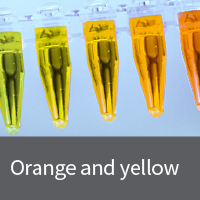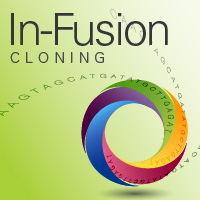mOrange2 fluorescent protein

Living Colors mOrange2 is an extremely bright orange fluorescent protein monomer ideal for use as a tag or reporter. The mOrange2 fluorescent protein mutant derived from a monomeric mutant of DsRed, which was developed in Dr. Roger Tsien’s lab (Nathan C Shaner et al. 2004; Wang et al. 2004; Shu et al. 2006) by directed mutagenesis (Campbell et al. 2002; N C Shaner et al. 2008). See our fluorescent protein quick guide for information on brightness and compatible microscope filters.
Overview
- Bright orange fluorescent protein monomers ideal for reporter studies
- mOrange2 excitation and emission maxima are 549 and 565 nm, respectively
- Can be detected on a Western blot using our mCherry antibody
More Information
Applications
- Fusions
- Tracking cell, organelle, and protein movement
- Bright reporter for mammalian cells
References
Campbell, R. E. et al. A monomeric red fluorescent protein. Proc. Natl. Acad. Sci. U. S. A. 99, 7877–82 (2002).
Shaner, N. C. et al. Improving the photostability of bright monomeric orange and red fluorescent proteins. Nat. Methods 5, 545–551 (2008).
Shaner, N. C. et al. Improved monomeric red, orange and yellow fluorescent proteins derived from Discosoma sp. red fluorescent protein. Nat. Biotechnol. 22, 1567–72 (2004).
Shu, X., Shaner, N. C., Yarbrough, C. A., Tsien, R. Y. & Remington, S. J. Novel chromophores and buried charges control color in mFruits. Biochemistry 45, 9639–9647 (2006).
Wang, L., Jackson, W. C., Steinbach, P. a & Tsien, R. Y. Evolution of new nonantibody proteins via iterative somatic hypermutation. Proc. Natl. Acad. Sci. U. S. A. 101, 16745–16749 (2004).
Additional product information
Please see the product's Certificate of Analysis for information about storage conditions, product components, and technical specifications. Please see the Kit Components List to determine kit components. Certificates of Analysis and Kit Components Lists are located under the Documents tab.
Fluorescent protein related links
Takara Bio USA, Inc.
United States/Canada: +1.800.662.2566 • Asia Pacific: +1.650.919.7300 • Europe: +33.(0)1.3904.6880 • Japan: +81.(0)77.565.6999
FOR RESEARCH USE ONLY. NOT FOR USE IN DIAGNOSTIC PROCEDURES. © 2025 Takara Bio Inc. All Rights Reserved. All trademarks are the property of Takara Bio Inc. or its affiliate(s) in the U.S. and/or other countries or their respective owners. Certain trademarks may not be registered in all jurisdictions. Additional product, intellectual property, and restricted use information is available at takarabio.com.





